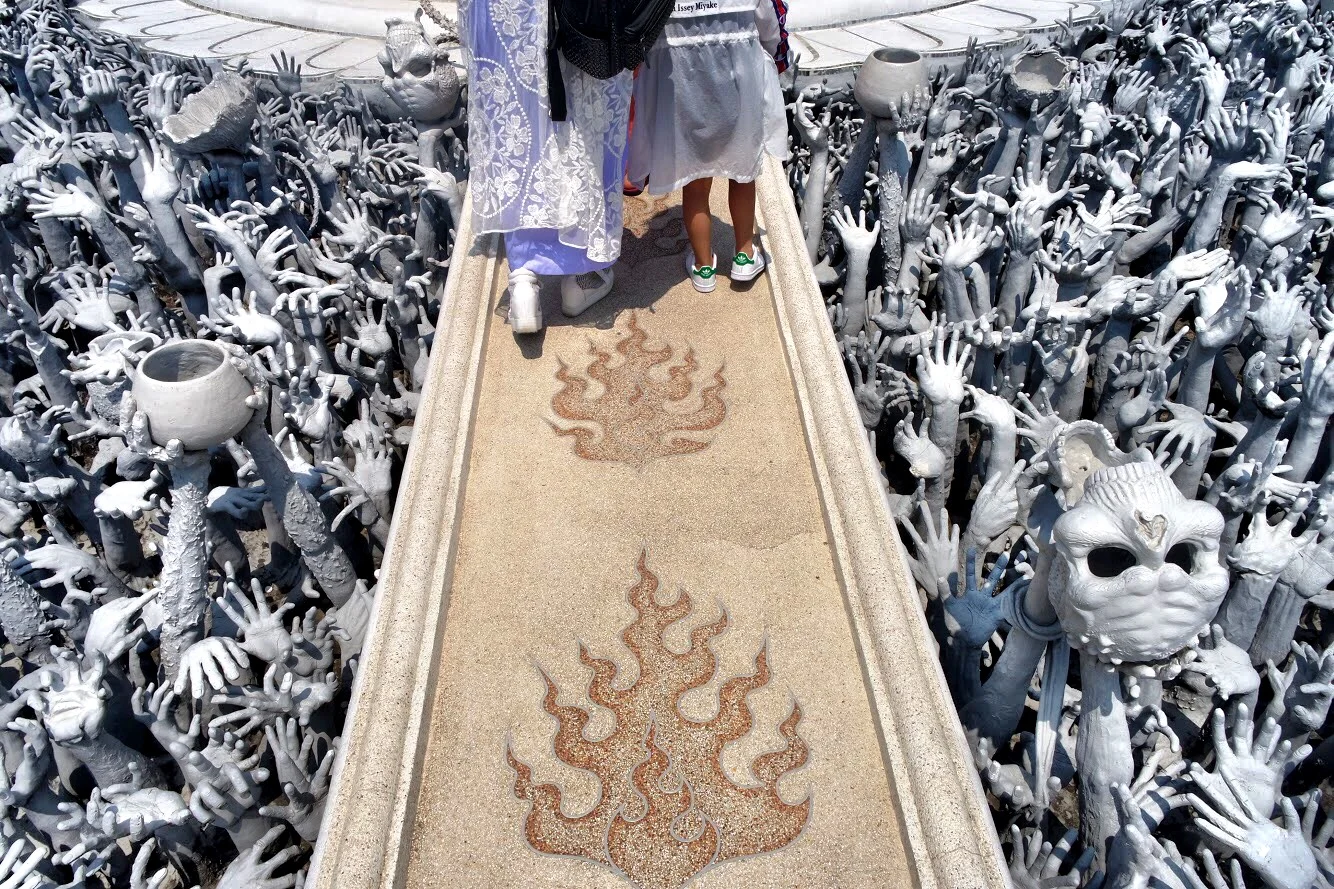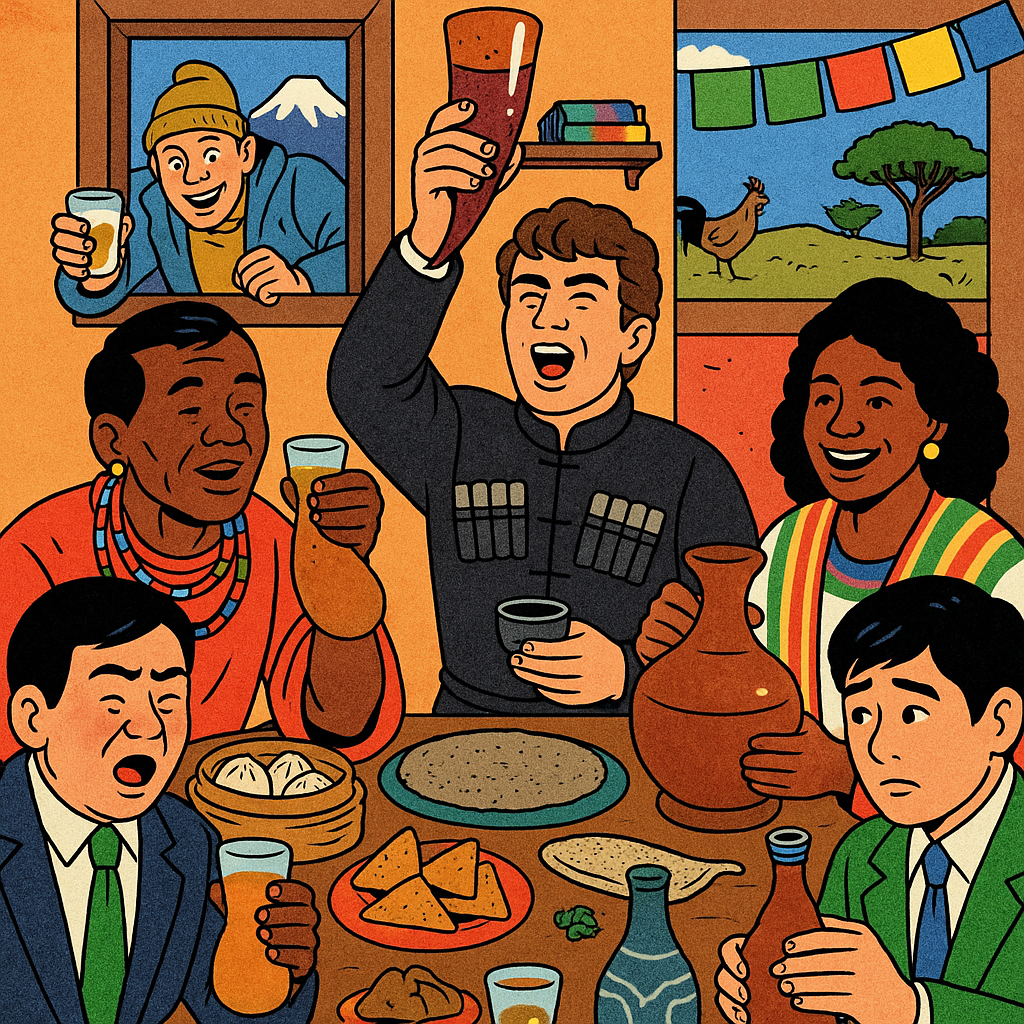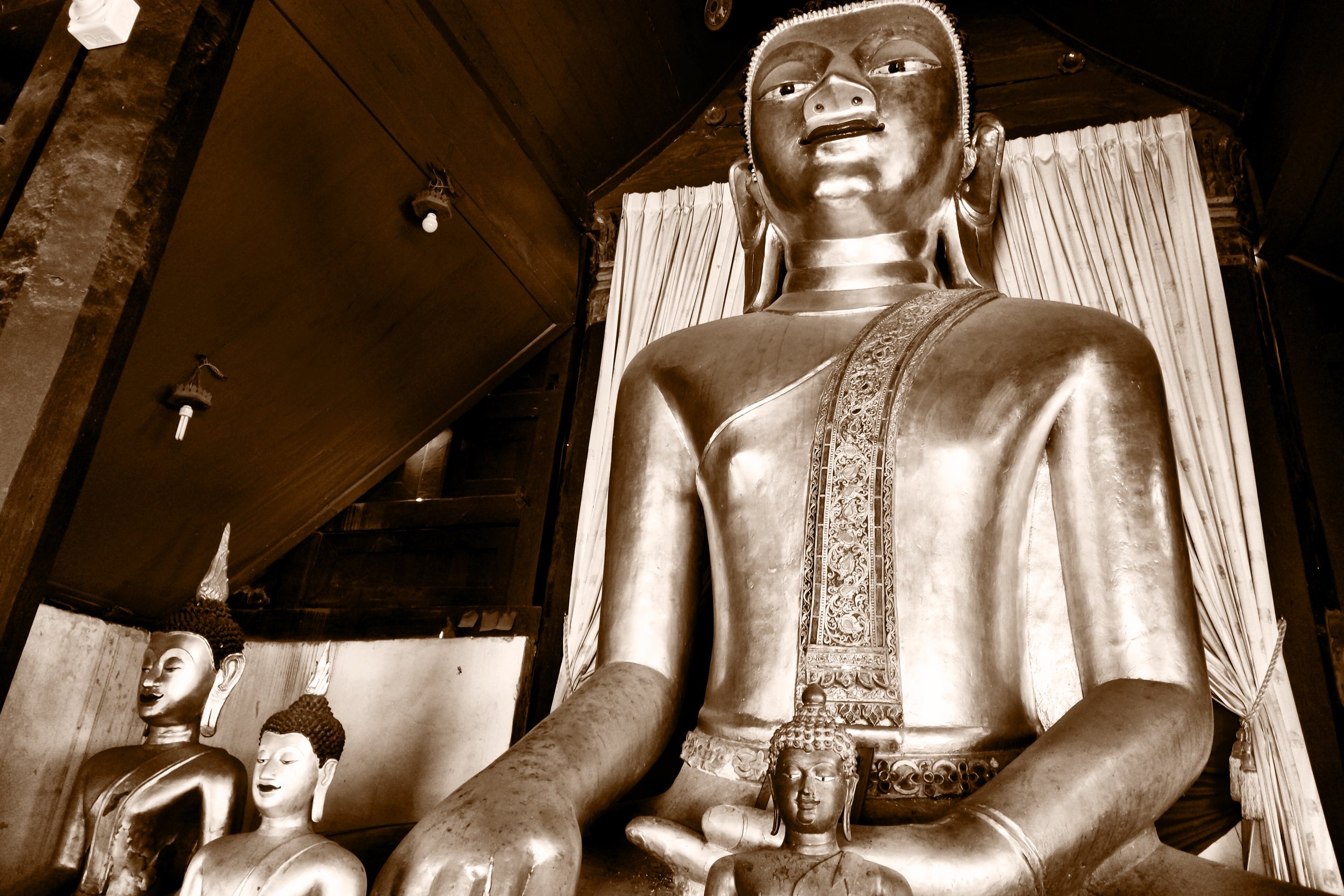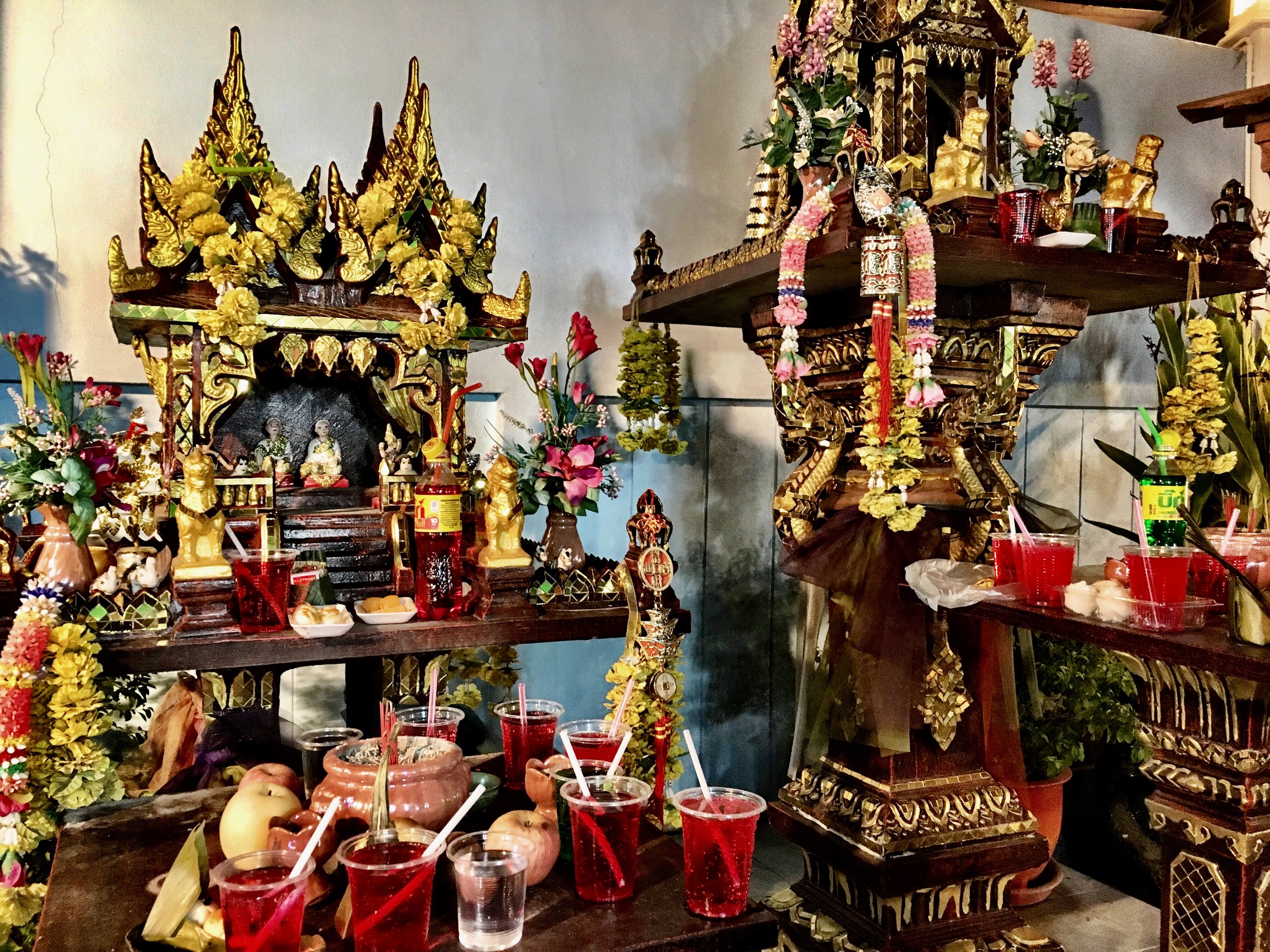One artist’s vision of purity — with plenty of pop icons thrown in as well. Where else can you see Hello Kitty, superheroes, Disney villains and Harry Potter engaged in an epic battle?
The White Temple is the most popular attraction in Chiang Rai, Thailand
Though he was born in Thailand, Chalermchai Kositpipat is not a typical Thai artist — as you can see from his masterpiece, the White Temple. Trained as a painter at Silpakorn University in Bangkok, he began working on his ambitious, non-traditional self-funded masterpiece, Wat Rong Khun, in 1997.
Duke at Wat Rong Khun. He tried not to be too upset that you can’t take any pictures inside the temple —you’ll just have to see that kooky pop culture-infused mural for yourself!
We hired a driver, the highly recommended Tommy (you can reach him at t.tommy2556@gmail.com) for 4,000 baht. Our day trip to Chiang Rai included the Blue Temple, the Black House Museum and a crazy Alice in Wonderland excursion through one of our favorite temples in Northern Thailand.
Wally made a new friend at the White Temple, where the pristine glory of the buildings pair strangely with pop culture references
“Delicate details embellish the exuberant structure of the White Temple like lavishly piped icing on a wedding cake. The overall effect is spectacular.”
If you’re staying in Chiang Mai, the White Temple is located further afield — about two and a half hours to the north.
Wat Rong Khun isn’t an actual temple — it’s more of an elaborate art installation
The White Temple isn’t complete, though Kositpipat says that when it’s finished, it will consist of nine separate buildings. The artist assumes that construction will continue well beyond his death.
The temple sustained earthquake damage on May 5, 2014, and at the time, Kositpipat declared that it would be closed indefinitely. It's perhaps not surprising that he was merely grandstanding, as his vision is considered controversial — it’s a vast departure from traditional Thai Buddhist temple art.
The White Temple is the singular vision of the once-controversial artist, Kostipipat
Over time, Kositpipat’s work has become more accepted, with the late Thai King Bhumibol Adulyadej among his clients. The unusual artist has been quoted as saying, “Only death can stop my dream but cannot stop my project,” which he believes will give him immortal life.
If you have hopes of getting a clear shot of the main hall and reflection pond, you may want to consider spending the night in Chiang Rai. We left Chiang Mai around 8:30 a.m. on a weekday, arriving at the same time as a fleet of tourist buses. Keep in mind that the White Temple closes every day between noon and 2 p.m. for lunch. Luckily, there’s a food court right on the premises. We had a decent lunch at a restaurant in the back corner.
The temple complex was crowded around midday
Monument to Impermanence
The main building is resplendent in white, plucked from a fairy tale but rooted in Buddhist mythology. It represents the purity of dharma, the Buddhist way of life. Delicate details embellish the exuberant structure like lavishly piped icing on a wedding cake. The color comes alive with the contrast of blue-gray shadows and small pieces of inlaid mirror that reflect sunlight. The overall effect is spectacular.
As we headed to the temple entrance, Wally and I passed a sinister sea of arms before crossing the bridge of the Cycle of Rebirth. It’s a disturbing glimpse of what awaits those who allow material desires to rule their lives.
You’re not going to want to fall into this moat!
The complex allows the viewer to become a voyeur. Much of the temple is dedicated to depicting samsara, the transformative Buddhist cycle of birth and death, due to delusion and fixation on the self.
As Depeche Mode sang, “The grabbing hands grab all they can.”
Hidden within the main hall, Kositpipat has dreamed up elaborate and unconventional murals, a bit of a trip down the rabbit hole, upending traditional Buddhist iconography and drawing upon elements from Western popular culture. Flames and the face of a giant demon whose mouth makes the doorway are paired with Hello Kitty, Elvis, Harry Potter, a few Pokémon, including Pikachu, Spider-Man, Iron Man, a Transformer, Neo from The Matrix, Superman, the killer puppet from Saw, Captain Jack Sparrow from The Pirates of the Caribbean and a crotch-grabbing Michael Jackson.
Reflected within the demon’s eyes are the twin towers of the former World Trade Center with the likeness of George W. Bush and Osama bin Laden. When asked about this mural, Kositpipat said, “I want everyone to know that our world is being destroyed by those who craved to build weapons that kill, thereby ruining the environment because nothing is ever enough.”
Photography is permitted throughout the grounds but not within the walls of the White Temple. Images of the mural can be purchased inside the gift shop.
The bathrooms at Wat Rong Khun are housed in this glorious golden building
Cool sculptures are found throughout the complex, like this one in front of the restrooms
The restrooms are located in an ornate pavilion known as the Golden Temple. Kostipipat chose this color scheme with the implied message to call attention to our materialistic tendencies and worldly desires.
Sign for the bathrooms at the White Temple
We purchased a heart-shaped silver bodhi leaf for 30฿ at one of the temple kiosks and hung it on one of the ornamental wish trees. I sure hope they don't routinely remove these like the locks on the Pont des Arts bridge in Paris, France.
Away from the main attraction, you’ll find quieter spots, like this natural grove
Behind the main part of the complex are some new buildings — and some still being built
Behind the compound and across a parking lot we discovered a large onsite workshop, where we took a peek behind the scenes and watched the artisans at work. It was a fascinating glimpse into the work that goes into fabricating Kositpipat's magical forms before they get assembled onto a building.
You can explore Kostipipat’s studio warehouse if you’d like
Adjacent to the temple is a gallery with a number of the artist’s painted masterpieces. You can purchase high-quality reproductions, books, T-shirts and postcards in the well-curated gift shop.
Look for heads of famous characters, like Wolverine and Maleficent. Such touches show the artist’s merging of whimsy and the macabre
Kostipipat’s world introduces elements of irony and self reflection with the promise of the unusual, but the vision is entirely his, and it’s beautiful. –Duke
“In the mural inside the temple, Hello Kitty, Elvis and Harry Potter battle the killer puppet from “Saw,” Captain Jack Sparrow and Michael Jackson.”
Wat Rong Khun
Pa O Don Chai Road
Phan, Chiang Rai































